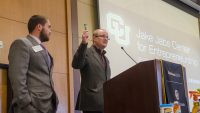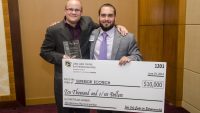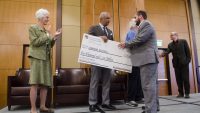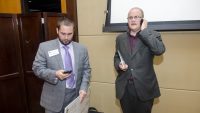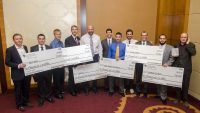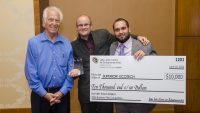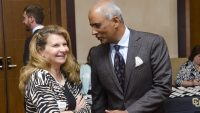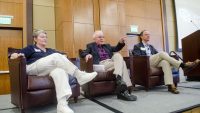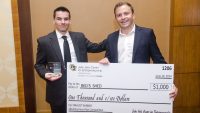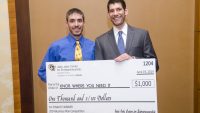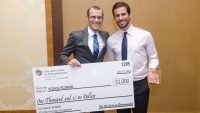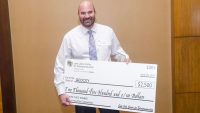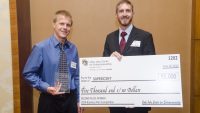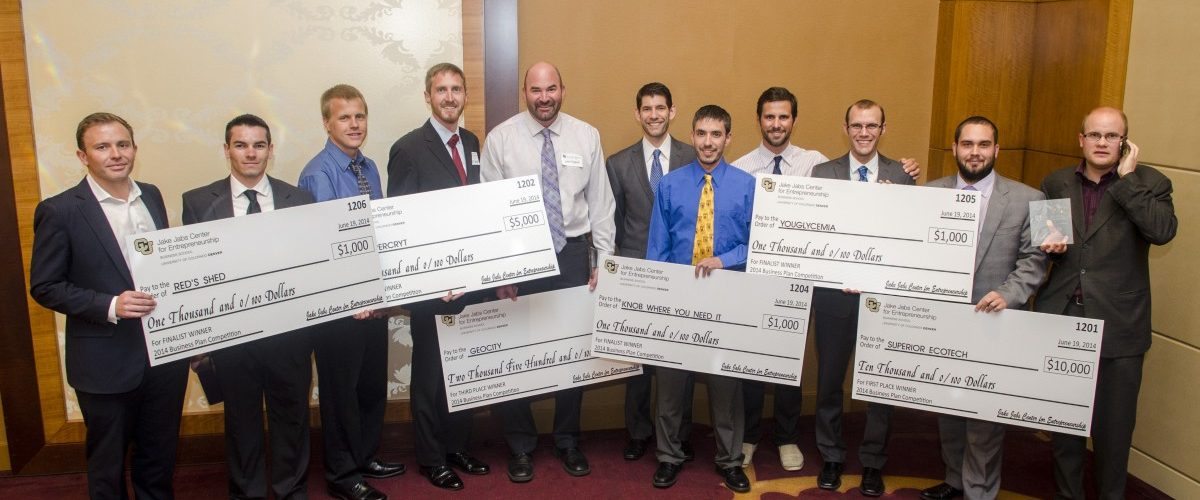
Use waste from breweries to make supplements
A novel way to create vegan spreads, cheese and dietary supplements using waste from breweries and ethanol plans won first prize Thursday in this year’s Business Plan Competition, sponsored by the Jake Jabs Center for Entrepreneurship at the University of Colorado Denver Business School. Daniel Higgs and Benjamin Mousseau won $10,000 for Superior Ecotech, a company that grows algae using waste carbon dioxide which then produces omega-3 rich oils for a range of products.
“We plan to build a thousand square foot greenhouse as a pilot industrial program on the roof of Upslope Brewery in Boulder later this year,” said 29-year-old Higgs, PhD student at CU Boulder. “Our product has better purity than others and we can sell in multiple markets.” This year’s competition saw 51 entries, the most in its 14 year history. And for the first time, the contest included universities throughout the entire Rocky Mountain West. “This year is bigger and better than ever before,” said Madhavan Parthasarathy, director of the Jake Jabs Center for Entrepreneurship. “Our goal is to be the best entrepreneurship center in the country.”
The second prize of $5,000 went to SuperCryt, a clean-technology business aimed at decontaminating water used in hydraulic fracturing. “A byproduct of fracking is contaminated water,” said Ian Jaeger, who along with co-founder Sean Wisner, is a graduate of the Business School’s Global Energy Management Program (GEM). “But when we are done with it all you have is dried salt which doesn’t have to be trucked away as hazardous waste.” The $2,500 third prize went to GeoCity, a company led by GEM graduate Joel Poppert that taps geothermal energy to heat and cool buildings and homes. “We deliver renewable energy 24/7, 365 days a year,” Poppert said. “The cost to the average homeowner would be about half of their monthly cable television bill.”
The finalists spent the morning presenting their plans before a panel of four judges, all entrepreneurs, who asked tough questions. Some finalists like Cory Civilla, who created Propane Mate, a gas grill accessory, told the judges up front that he had no start up experience. “We have a great idea and a great product but we are very early in the process,” said Civilla, an MBA student at the CU Denver Business School who created the Propane Mate with his brother Adam. The Civillas won $1,000 as a runner-up.
The other two runner ups also took home $1,000 each. They included YOUglycemia, a group of medical professionals who help diabetic manage their condition and Red’s Shed, a Denver-based business where people rent tools, camping equipment and sporting equipment from each other. All six finalists will receive free legal, marketing and accounting services from local businesses.
The event, emceed by Jim Benemann of CBS4, featured a talk by Jake Jabs, owner and CEO of American Furniture Warehouse. Last year, Jabs donated $10 million to the Business School, the largest donation ever to CU Denver. “How do you promote a business these days? You need a good building, a good sign and you need to be all over social media,” Jabs said. “The advertising industry is fragmented so you need a great website, you need to be on Facebook and Pinterest and Twitter.”
The keynote speakers were the Appel family, who created a line of cleaners in their garage that became the globally famous OxiClean, Orange Glo and Kaboom. “We’d go to Anaheim as kids but not to see Disneyland, but to sell cleaning products,” said Joel Appel, who now teaches entrepreneurial marketing at the Business School. His parents, Elaine and Max, sat onstage with him and discussed their early days. They created cleaning products at home and took them to home shows and state fairs which they used as focus groups to get instant feedback. If someone didn’t like the smell, they changed it. “You need a product people want and need and if they don’t want and need it you need to persuade them that they do,” said Elaine Appel.
The family used well-known TV pitchman Billy Mays to advertise OxiClean. When Mays died, they said, he was buried in an OxiClean shirt and his pallbearers wore them as well. “You want to differentiate your product and then service people to death,” Max Appel said. “One bad customer will cost you 20 more.” Ultimately, he said, when you are an entrepreneur you should be thinking about money “even when you are making love.”
Related Stories in the News:
[links category_name=”Jake Jabs Business Plan Competition”][presskitlink url=”http://business-news.ucdenver.edu/wp-content/uploads/2014-EPK-Business_Plan_Competition1.zip”]


